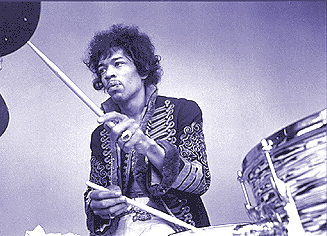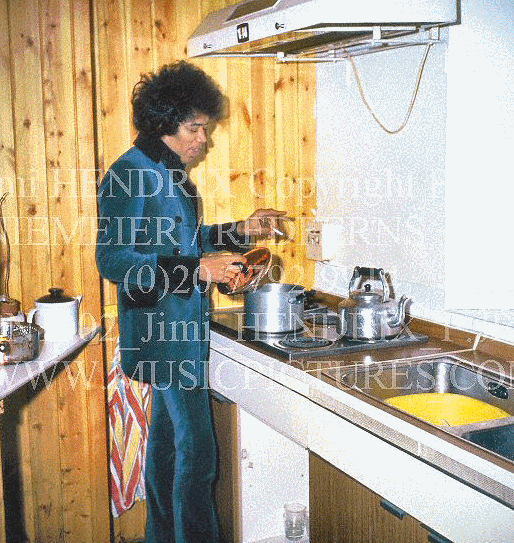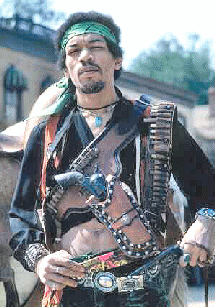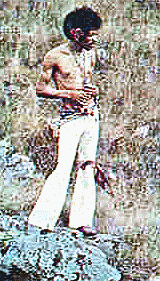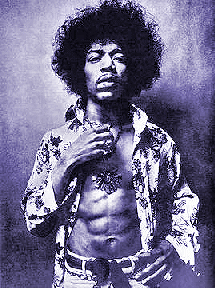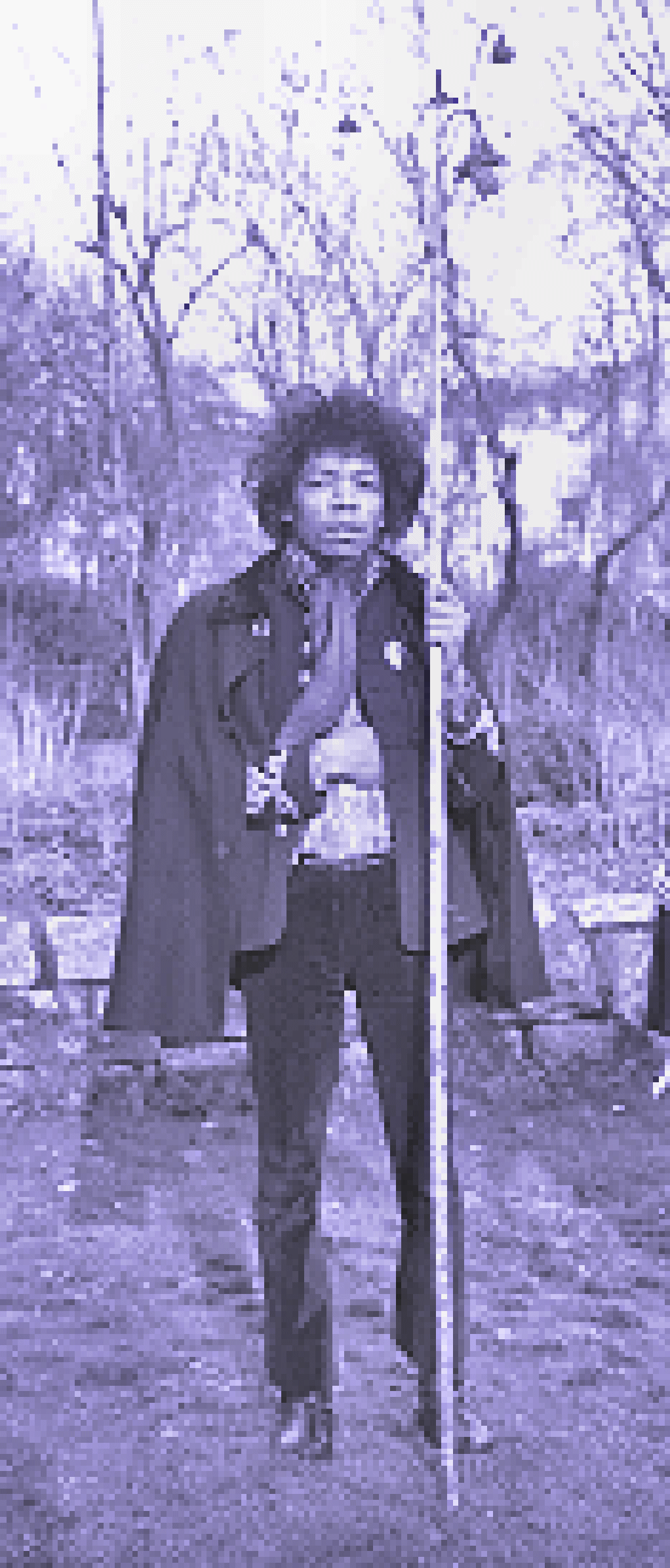 |
  |
 |
published: August 28, "2005"
Dominator Blues |
|

What's New & Previews
Jimi's Prediction —
A Remote View About Jimi Hendrix Timeline Blog Asteroid Impact Evolution Woodstock Blues Jimi Code VS. Da Vinci Code Credit Thefts Missile Agency/Moon Base Charade Remote View Mutation Seattleland Censorship Events Skewed Science Search Engine Rankings Download An Ad AT&T: New Nuremberg Wall(y)flower Syndrome Rochester Media DVD/CD Store More Links...  Page 4 of 7
AFRICAN DRUMS
PBS 2003: Many people have gone to Africa to search for musical links with the blues. When you listen to the fife and drum, the presence of Africa is unmistakable. Something was kept alive in this music. These rhythms were carefully preserved and passed down generation after generation, through Jim Crow, right up to the present. It was an act of survival. It's a miracle that the fife and drum made it all the way to northern Mississippi because, before the Civil War, slave drums were banned throughout the south. If you were caught with a drum you could be put to death. Because drums were banned over here, other instruments took on the role of percussion. This is one of the key elements that connect Africa all the way to the blues.
RP 1999: Tribal customs imported to America with African slaves preserved the ancient rites of possession. Pagans appeared on the Mississippi Delta and showed Christians how to unite spirit with flesh. Government authorities abhorred the practice and decreed a ban on native drums. The Loa dance was outlawed in New Orleans in 1875. Jim Crow laws forbid blacks to gather in public parks. Dance ceremonials among American Indians were likewise prohibited by the United States government in 1904. The ban stayed in effect for thirty years. To compensate for this silencing of sacred drums, and stilling of the possession dance, slaves created blues. Blues vented an overflowing animist instinct that had been stifled by Puritan prohibition laws. The blues was everything African that had been lost, distilled into a sound where it could be found again…One man could play the blues, so it was a form that allowed one man to preserve, add to, and pass on what, in its native form, had taken an entire tribe. Its beat was so implicit that the African, for the first time, didn't need a drum. The holy drum, the drum that is always silent, lived in the blues. One man with a guitar could play the blues and his entire tradition would be alive in his playing…So in place of tribal Voodoo jigs, communion with Loas was instead achieved through performance of blues.
Possession survived.
PBS 2003: The blues connects with my ancestors and my history. Every song tells another part of the story. Through playing the music I began to understand. To know yourself, you have to know your past, and to know where you're going you have to know where you've been…what life was like for them at that time…there was a lot of land to be trying to till, something they was doing back in the day, a lot of mules and men, a lot of people washing clothes, and a whole bunch of biscuits and cobbler. That type of life, coupled with the way people lived, and the intensity of the times - the Delta produced a real strong, hard-driving music.
MCA 1994: "I wish they'd had electric guitars in cotton fields back in the good old days. A whole lot of things would've been straightened out…The background of our music is a Spiritual Blues thing. Blues is a part of America. We're making our music into Electric Church Music; a new kind of Bible, not like in a hotel, but a Bible you carry in your hearts, one that will give you a physical feeling." - Jimi
PBS 2003: Culturally, [blues] was thrown into the trash bin. There was a definite move to trash that culture and keep it away from white kids.
RP 1999: Bans on bodily delights are key aspects of blues history, and Jimi Hendrix, with his Afro-Irish Voodoo roots, is a seminal symbol of blues. In the West, Hendrix represents everything that Church Fathers condemn…Blues is music about the beat, the beat that inspires dance. When drum rhythms from the possession dance were used as backbeats for rock 'n' roll, the stage was set for a collision of myths. In 1956, mass markets in the West channeled Africa through Elvis. Presley's popularity introduced a mass audience of teens to the intoxicating effects of jungle drums. A spell had been cast as a frenzy of Loas inhabited the heartland. With more force than ever before, natural human impulses collided with biblical prohibitions against sensuality and sex. Our Western emphasis on spirit over matter collapsed into carnal snake dance. Body-music blues urged clergy to boogie. "Africa" battled the Vatican. Puritan establishments were reviled by the pelvic paganisms of Elvis and his tribe. Rock 'n' roll made the young get funky. Jungle drums rekindled the frenzy of possession. Like pre-Christian heathens in dance-trance abandon, American youth of the 1950s became living cathedrals receptive of intoxicating spirits. After centuries of pious abstinence, the tribes were naturemen again.
RP 1999: As the living embodiment of this lineage, Jimi played a shaman's Pied Piper role in leading hippies of the 1960s to convene in a manner alien to the prevailing ways of Western civilization. The behavior of rock culture teens was at odds with the conduct of their parents because the message transmitted through rock is at odds with Judeo-Christian myths. Rock was new during Jimi's career and it carried a message of possession, shaking to the beat in sexually expressive ways. Rhythm and movement excite our senses and incite arousal of physical feeling. Throughout history Indian seers and African shamans have transformed themselves through these dances.
RP 1999: The story of blues music, and of Voodoo's impact on the Messiah religions, is the hallmark of our time, explaining a collision of myths, fueled by renewed use of hallucinogens, and epitomized by the life of Hendrix. From the first the music has felt like an attack on the institutions that it was actually attacking.
PBS 2003: Voodoo Child [a Jimi Hendrix song], that was a Muddy Waters type thing, and I talked to Jimi about that, he knew, you know, he would tell me this is Muddy Waters stuff.
RP 1999: Voodoo Chile is a Hendrix song evolved directly out of Catfish Blues, an early traditional blues standard; Voodoo Chile [includes] lyrics that Jimi spun off from Catfish Blues, the Delta staple made famous by Muddy Waters.
RP 1999: Robert Moore, the great-grandfather of Jimi Hendrix, was an Irishman, and Irish lore is central to Voodoo and blues history. Jimi's ancestry links him to these Voodoo cultures at the root of blues. His Afro-Irish blend combines with his part-Cherokee heritage to produce a classic lineage of the blues, because it was in America that Afro-Celtic Voodoo rites blossomed into a new music called blues.
RP 1999: In the 1650s…Oliver Cromwell left his brother, Henry, as [Ireland's] governor. In the next decade, Henry sold thousands of Irish people, mostly women and children, as slaves to the West Indies. Estimates range between 30,000 and 80,000…Henry was trying to sell off as many pagans as he could. This was at the height of the English witch craze, which was a pogrom against those who still adhered to the Celtic religions. Ireland was the stronghold for the old beliefs. This explains the mercilessness of Cromwell's massacres…in Ireland the old ways were more a way of life than anywhere else…In the West Indies the Irish slaves, most of them women, were mated with the Africans…Virtually every account of Voodoo notes, at some point, how similar are its sorcery practices to the practices of European witchcraft…practicing pagans from Ireland infused their beliefs with the Africans, mingling in Voodoo two great streams of non-Christianist metaphysics.
RP 1999: The Hendrix family tree has roots in Africa and Georgia. Jimi's lineage is also Cherokee and Irish, and Irish/African lore is at the core of blues and Voodoo history. This Afro-Irish cauldron, within an American Cherokee melting pot, constitutes Jimi's classic lineage of the blues, "classic" because blues music itself is encoded with images and rhythms from Afro-Celtic Voodoo.
RP 1999: When Celtic customs mingled with Voodoo ways in the Caribbean and in South America, both belief systems had to adapt to Catholic rule. Voodoo and pagan practices were subordinate to a Catholic establishment in the Americas. It is this Afro-Irish mixture of rituals and religions that forms the Voodoo religion which was imported to the southern United States. It is no accident that what most closely resembles an old New Orleans funeral is an Irish wake, these are the two modern cultures most in touch with their non-Christianist roots…In Abomey Africa…deities that speak through humans are called 'vodun.' The word means 'mysteries.' From their 'vodun' comes our Voodoo…Voodoo consistently emphasizes that the holy and the earthly are supposed to meld in the body itself, and that to split the mind from the body is to do evil.
RP 1999: Voodoo Child is a tune Jimi repeated anthem-like on stage to drive home the point: we connect with the Earth only when nature is alien no more. It was as if music had activated what we needed to be complete: a reunion of body/mind fragments.
|
| © 2005 First Century Press. All Rights Reserved. Contact Us |

